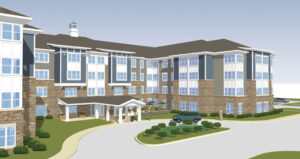Repurposing existing structures into senior housing might alleviate some of the uptick in need for housing and care as the oldest baby boomers, turning 76 this year, look for senior housing in the coming years. That’s according to the New York-based Ritz Herald.
With cost inflation and supply chain issues affecting new construction, investors are looking for the best return on their investment. Oftentimes, repurposing existing structures is cheaper and faster than ground-up development, according to Bisnow.
“Sometimes you can save money by doing repurposing, but what you really save is schedule, and schedule, you know, equates to cost savings,” Meridian Chief Development Officer Mike Conn told Bisnow.
Repurposing existing structures for a new use as senior housing has been trending in parts of the country since the pandemic, McKnight’s previously reported. In Chicago last year, several senior housing firms began adaptive reuse projects to preserve existing, sometimes historic, buildings and, thus, improve the neighborhood while offering new options for senior living.
“Whereas ground-up development requires infrastructure to be established and walls to be erected, a conversion project gives investors the opportunity to improve upon what is already existing. Instead of building an entirely new property, investors can renovate an existing one and have it up and running in a shorter time,”the Ritz Herald noted.
The hotel industry was hit hard by the COVID-19 pandemic, and some investors, even in Europe, are looking at repurposing once thriving hotels into senior living resorts, the Ritz Herald said.
“Although many hotels have started to rebound and the hotel industry as a whole is on an upward trend, these challenging hurdles have highlighted that some hotel properties may not be the highest and best use for their location,” according to the Ritz Herald. “These properties, though they may no longer be viable options for hotel investment, offer an interesting opportunity for senior housing.”
Repurposing existing hotels makes sense, according to the media outlet, because they typically have offered similar amenities and accessibilities that senior housing developers are looking for. Most have kitchens capable of facilitating cooking for large groups all at once as well as shared common areas that can be used for group activities. The properties often are centrally located with access to main roads.
Challenges exist to repurposing existing structures, however, the Ritz Herald noted. For example, while modifying the inside, construction crews might find structural damage or other unforeseen obstacles. Additionally, it might be necessary to change the existing zoning code where the property is located. There is always the risk that the request could be denied.
“While not every property will be an option and not every investor will wish to tackle such a project, transforming hotels into senior living is a viable strategy,” the Ritz Herald concluded.
KATHLEEN STEELE GAIVIN





